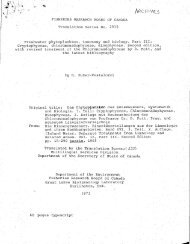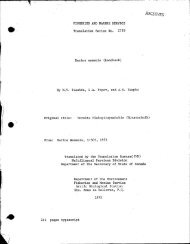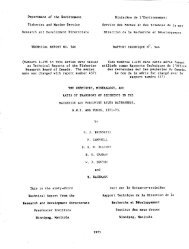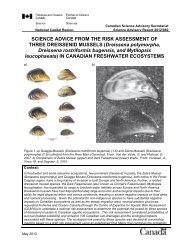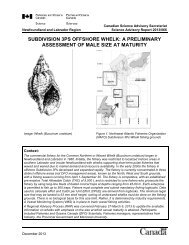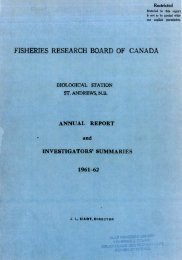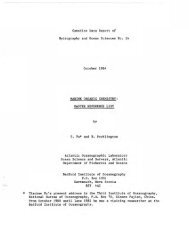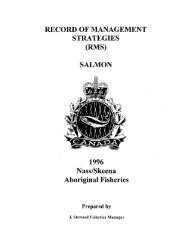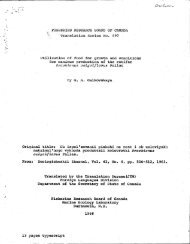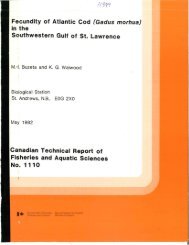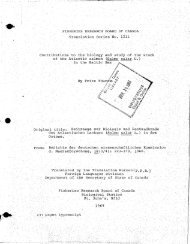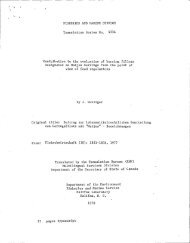- Page 1 and 2:
ANNUAL REPORT OF THE DEPARTMENT OF
- Page 3 and 4:
INDEX TO THE REPORT ON THE FISHERIE
- Page 5 and 6:
FIFTH ANNUAL REPORT DEPUTY OF TILE
- Page 7 and 8:
The decrease in lobsters was genera
- Page 9 and 10:
xi Fisheries, issue a fishery licen
- Page 11 and 12:
xlii The above remarks apply with e
- Page 13 and 14:
xv BUILDING OF FISIIWAYS. Six new f
- Page 15 and 16:
xvii This Expenditure is snb.dicidc
- Page 17 and 18:
xix FISH BREEDING—Concluded St. J
- Page 19 and 20:
Lbs. Bris. xxi GENERAL RECAPITULATI
- Page 21 and 22:
xxiii COMPARATIVE STATEMENT Of Prod
- Page 23 and 24:
xxv COMPARATIVE STATE4ENT Of Produc
- Page 25 and 26:
... 12,100 xxvii COMPARATIVE STATEI
- Page 27 and 28:
00 C? U? U? U, 0 U? '-4 00 00000000
- Page 29 and 30:
APPENDIX No. i. FISHING BOUNTIES. G
- Page 31 and 32:
3 DETAILED STATEMENT showing Fishin
- Page 33 and 34:
5 DETAILED STATEMENT of Fishing Bou
- Page 35 and 36:
. 7 DETAILED STATEMENT of Fishing B
- Page 37 and 38:
. 9 DItTAILED STATEMENT of Fishing
- Page 39 and 40:
11 DETAILED STATEMENT of Fishing Bo
- Page 41 and 42:
13 DETAILED STATEMENT of Fishing Bo
- Page 43 and 44:
15 DETAILED STATEMENT of Fishing Bo
- Page 45 and 46:
17 DETAILED STATEMENT of Fishing Bo
- Page 47 and 48:
19 DETAILED STATEMENT of Fishing Bo
- Page 49 and 50:
21 IETAILED STATEMENT of Fishing Bo
- Page 51 and 52:
23 DETAILED STATEMENT of Fishing Bo
- Page 53 and 54:
25 DETA1LD STATEMKNF of Fishing Bou
- Page 55 and 56:
27 The following Vessels for 1886,
- Page 57 and 58:
' 0 eq 040 Co C 00 0 C) Co Co ' °'
- Page 59 and 60:
10000 cv) cvi — t '-4COC) eqioc'
- Page 61 and 62:
33 To permanently improve and maint
- Page 63 and 64:
35 SHAD. Native shad still continue
- Page 65 and 66:
37 is yearly increasing. Mr. Bailey
- Page 67 and 68:
39 bay did nothing. He is glad, how
- Page 69 and 70:
41 factories purchase by the hundre
- Page 71 and 72:
43 Oversetr John Fitzgerald, of Mil
- Page 73 and 74:
45 On the whole, I am glad to repor
- Page 75 and 76:
47 CAUSES OF SHORTAGE. These are va
- Page 77 and 78:
49 slight chance of procuring even
- Page 79 and 80:
51 NUISANCES. The action of your De
- Page 81 and 82:
53 quality. Halibut was a complete
- Page 83 and 84:
55 consideration, however, it has b
- Page 85 and 86:
______________________ 1000 57 SCOT
- Page 87 and 88:
300 1000 5... 59 the Fisheries, Qua
- Page 89 and 90:
61 the Fisheries, Quantity and Valu
- Page 91 and 92:
63 the Fisheries, Quantity and Valu
- Page 93 and 94:
. 465 150 65 the Fisheries, Quantit
- Page 95 and 96:
C) C) • C) ' 00 0-. CO IC) CO —
- Page 97 and 98:
-o i — 00 00 100 0 C) CoIC) Co C)
- Page 99 and 100:
In the Fisheries, Quantity and VIue
- Page 101 and 102:
. 3600 500 50 .. .... 15 20. 100 10
- Page 103 and 104:
the FiherieR, Quantity and ST1u of
- Page 105 and 106:
the Fisheries, Quantity and Value o
- Page 107 and 108:
79 the Fisheries, Quantity and Valu
- Page 109 and 110:
400 600 ......... 5000 18000 19640
- Page 111 and 112:
- ...... 75 685 .... 16800 402 220
- Page 113 and 114:
30 64,217 85 the Fisheries, Quantit
- Page 115 and 116:
87 000000000 o 0—' 0000 -.0 CO 00
- Page 117 and 118:
04000 •aoe- 0D0I0 eq1010 -CD0000e
- Page 119 and 120:
91 TABLE showing the Value of the F
- Page 121 and 122:
93 APPENDIX No. 3. NEW BRUNSWICK. A
- Page 123 and 124:
95 in every report made since I hav
- Page 125 and 126:
97 LOBSTERS. This fishery has almos
- Page 127 and 128:
99 which required both vigilance an
- Page 129 and 130:
101 Overseer Gtuimond, of St. Louis
- Page 131 and 132:
103 Overseer Burtt, of the Lower Di
- Page 133 and 134:
105 Overseer Lord, of Deer Island a
- Page 135 and 136:
C) qI • ( .s - .m s pn tj8i 8 'i
- Page 137 and 138:
00 109 o 000010—0000000) o 10 eq
- Page 139 and 140:
. C) i'q '1tlu .tu souq p8fl '1L 'q
- Page 141 and 142:
113 : : : m 2 ri Q - . ;, 8-8 cq rJ
- Page 143 and 144:
0 115 Tn :': I 8—8k
- Page 145 and 146:
117 C) ' • -viii 'eauq'o1uu ew pe
- Page 147 and 148:
119 NUMBER AND VALUE of Vessels, Bo
- Page 149 and 150:
121 ened flhiog is, in itelf, suffi
- Page 151 and 152:
123 under 13,000 barrels, This is a
- Page 153 and 154:
125 to one pound of dry, the cod an
- Page 155 and 156:
127 to reproduce their species; tha
- Page 157 and 158:
129 Natural oyster beds owe their l
- Page 159 and 160:
131 are in the province, and almost
- Page 161 and 162:
133 the Fisheries, Quantity and Val
- Page 163 and 164:
. . 135 eDgaged in the Fisheries &e
- Page 165 and 166:
137 engaged in the Fisheries, &o.
- Page 167 and 168:
139 RECAPITULATION. YIELD and Value
- Page 169 and 170:
141 APPENDIX No. 5. QUEBEC. REPORT
- Page 171 and 172:
143 pleased with the action of the
- Page 173 and 174:
145 NEW RICHMOND SUB-DIVISION. Mr.
- Page 175 and 176:
147 STE. ANNE DES MONTS SUB-DIVISIO
- Page 177 and 178:
149 taken for local consumption. Th
- Page 179 and 180:
. . 151 of Bonaventure, extending f
- Page 181 and 182:
...... 2272. ... 66 153 of Gaspé,
- Page 183 and 184:
155 and Nets, &c., in the County of
- Page 185 and 186:
, 157 Fishing Materials, &c., in th
- Page 187 and 188:
9. 29 . ________ 159 of Saguenay, e
- Page 189 and 190:
161 Nets, &c., in the County of Sag
- Page 191 and 192:
163 Nets, &e., in the Cowity of Sag
- Page 193 and 194:
165 Nets, &o., in the County of Sag
- Page 195 and 196:
C) 0 00 167 00000000 Cl) 0'400 coo
- Page 197 and 198:
1(9 :STATEMENT of Value of Lobster
- Page 199 and 200:
171 SYOPiSES OF FISHERY OVERSEiRS'
- Page 201 and 202:
173 Overseer Jos Gin gras, of the Y
- Page 203 and 204:
175 nd no violations were reported.
- Page 205 and 206:
• . 177 EXOJJUSIE OF THE GULF OF
- Page 207 and 208:
. ...... . 1. 35 10 . ....,.... 1,0
- Page 209 and 210:
181 with the Yield, Value and Kinds
- Page 211 and 212:
. . 183 together with the Yield, Va
- Page 213 and 214:
.. 185 BEOAi'ITULATION OF the Quant
- Page 215 and 216: 187 APPENDIX NQ 6. ONTARIO. SYNOPSE
- Page 217 and 218: 18 Overseer J. A. Couse, who replac
- Page 219 and 220: 191 have they become numerous, but
- Page 221 and 222: 193 waters, all fishing is done by
- Page 223 and 224: 195 are maskinongé, pike, bass and
- Page 225 and 226: 197 .Rattlesnake Harbor, but found
- Page 227 and 228: 199 eports from Tobermoray, Club Is
- Page 229 and 230: 201 CONCLUSION. The presence of the
- Page 231 and 232: - ..... . 2 8 . 2 25 180 2500 16000
- Page 233 and 234: . 13000 . 70000 14,000 .. 205 and F
- Page 235 and 236: 650 10000 2000 4,380 48,398 207 and
- Page 237 and 238: 209 £nd Fishing Materials, &c.—
- Page 239 and 240: . . 211 and Fishing Materials, &e.
- Page 241 and 242: . 3500 213 and Fishing Materials, &
- Page 243 and 244: 215 40 dLunsuoD 9000J3 - 004.4 0 00
- Page 245 and 246: 217 APPENDIX No. 7. IIAMTOBA ANP TH
- Page 247 and 248: 219 will no doubt have been similar
- Page 249 and 250: 221 Their plant consisted of the fo
- Page 251 and 252: 223 3.—Total exportation from Win
- Page 253 and 254: 225 BEaEN'S RIVER—LAKE WINNIPEG.
- Page 255 and 256: 227 The catch is a little larger th
- Page 257 and 258: 229 which was perhaps greitly owirg
- Page 259 and 260: 231 CB.AVEN P. 0., N.W.T., 31st Dec
- Page 261 and 262: 233 APPENDIX No.8. BRITISH COLUMBIA
- Page 263 and 264: a a) . 4— — . CD 00 0 4 CO o Co
- Page 265: 237 judgment is required for the fo
- Page 269 and 270: 241 It has been estimated that 16,0
- Page 271 and 272: 243 While in consultation with the
- Page 273 and 274: 2t5 suggestion to recommend to the
- Page 275 and 276: 247 Nicola Lake is twenty miles lon
- Page 277 and 278: 249 I arrived at Naas Harbor on ste
- Page 279 and 280: 251 man fishes anywhere and has no
- Page 281 and 282: 253 Co Co .1-I 0 C) 0 Co 0 0 04 0 C
- Page 283 and 284: 255 NUMBER and Value of Vesse1', Bo
- Page 285 and 286: CONTENTS. OF THE SUPERINTENDENT'S R
- Page 287 and 288: 4 duty it is to look after the fish
- Page 289 and 290: 6 A recapitulation of the expendit
- Page 291 and 292: 8 In the "eyed egg" column of the a
- Page 293 and 294: 10 0 $ E 0 w 0 0)000000000000000 o
- Page 295 and 296: 12 Some interesting letters will be
- Page 297 and 298: 14 .5,550 each. These are reported
- Page 299 and 300: 16 hatchery lake, like the Mowat's
- Page 301 and 302: 18 get injured and die. Notwithstan
- Page 303 and 304: 20 PRACTICAL RESULTS FROM ARTIFICIA
- Page 305 and 306: 22 fish. They appear to be about on
- Page 307 and 308: 24 James Lawlor, a net fisherman, s
- Page 309 and 310: 26 the returns from which I have ob
- Page 311 and 312: 28 upon one another was, no doubt,
- Page 313 and 314: 30 Mr. Mowat also adds: I take the
- Page 315 and 316: 32 establishments. Whilst their acc
- Page 317 and 318:
34 "A river may quickly be emptied
- Page 319 and 320:
36 industry of the country, whose c
- Page 321 and 322:
38 G-rand total distributed 1888. S
- Page 323 and 324:
40 ing grounds on the Harrison I fo
- Page 325 and 326:
42 The ova are at present in a most
- Page 327 and 328:
_______ 44 Little Salmon River,, Ha
- Page 329 and 330:
46 Musquodoboit River, all the pare
- Page 331 and 332:
48 and got crosswise of the main pa
- Page 333 and 334:
50 year. In accordance with the ins
- Page 335 and 336:
52 be very great. The work in the p
- Page 337 and 338:
54 The Mission Point net was set in
- Page 339 and 340:
56 The fry were deposited in the ri
- Page 341 and 342:
58 commenced on the 24th of October
- Page 343 and 344:
60 WHITEFISH DISTRIBUTION. 1888. la
- Page 345 and 346:
62 North cf Gananoque, Lake Singlet
- Page 347 and 348:
64 Supply Fond or Main Reservoir. T
- Page 349 and 350:
66 A STATJIMtNT showing the daily o
- Page 351 and 352:
68 From these eggs we had very good
- Page 353 and 354:
REPORT ON THE FISHERIES PROTECTION
- Page 355 and 356:
INDEX TO CONTENTS. PAGE. Dominion C
- Page 357 and 358:
8 A statement of the expenditure in
- Page 359 and 360:
10 Under this modus vivendi and unt
- Page 361 and 362:
12 It was agreed with the Governmen
- Page 363 and 364:
14 showed fitfully, but in small sc
- Page 365 and 366:
16 Many United States captains admi
- Page 367 and 368:
18 coast and in its tidal eddies, t
- Page 369 and 370:
20 Oorresp3ndent mailed me a daily
- Page 371 and 372:
From 12th to 17th July in Pictou, f
- Page 373:
S Boston S S 24 LIST of United Stat



